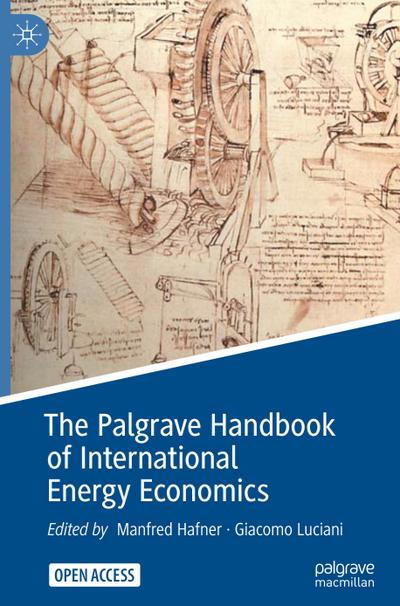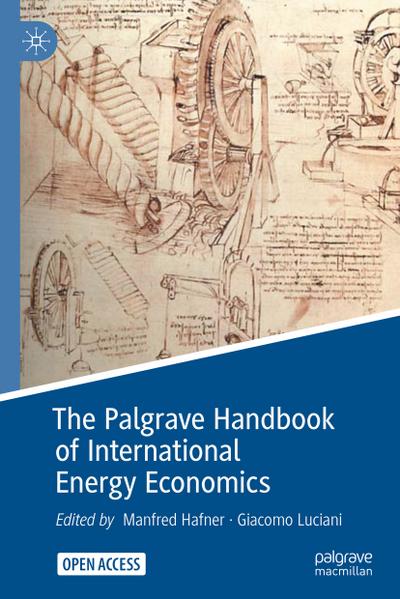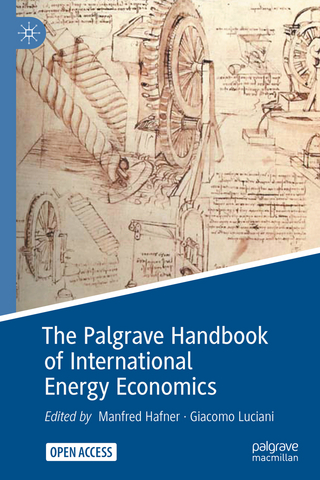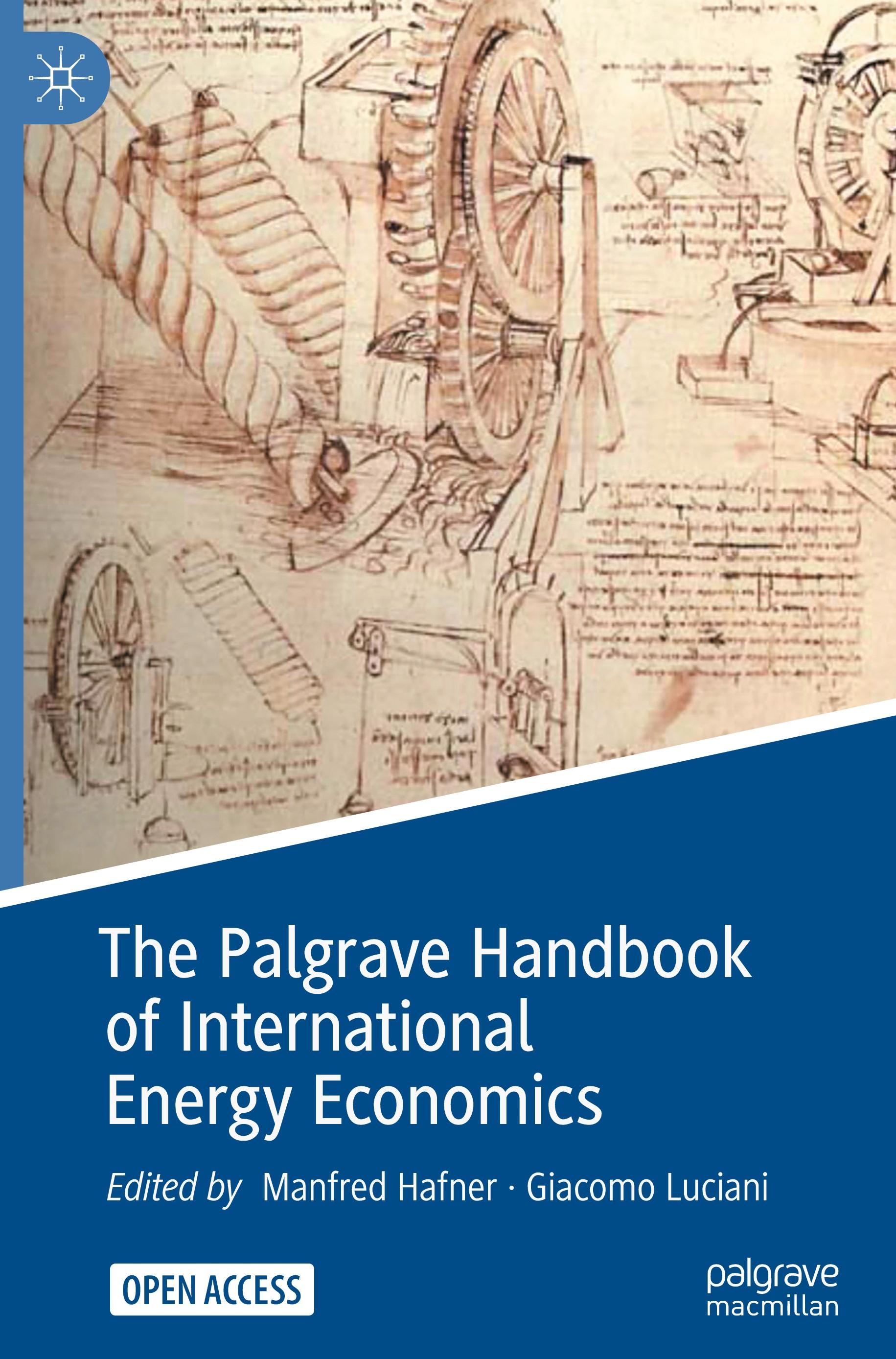
2022, ISBN: 3030868834
[EAN: 9783030868833], Neubuch, [SC: 0.0], [PU: Springer International Publishing], ECONOMICSOFENERGYPRODUCTIONANDDISTRIBUTION; OIL; GAS; COAL; ELECTRICITY; BIOFUELS; ECONOMICSOFPOWERGENER… Mehr…
| ZVAB.com AHA-BUCH GmbH, Einbeck, Germany [51283250] [Rating: 5 (von 5)] NEW BOOK. Versandkosten:Versandkostenfrei. (EUR 0.00) Details... |

2022, ISBN: 3030868834
[EAN: 9783030868833], [PU: Palgrave Macmillan], ECONOMICSOFENERGYPRODUCTIONANDDISTRIBUTION; OIL; GAS; COAL; ELECTRICITY; BIOFUELS; ECONOMICSOFPOWERGENERATION; ECONOMICSOFRENEWABLES; ENERG… Mehr…
| AbeBooks.de Rheinberg-Buch Andreas Meier eK, Bergisch Gladbach, Germany [53870650] [Rating: 5 (von 5)] Versandkosten:Versandkostenfrei. (EUR 0.00) Details... |

2022, ISBN: 9783030868833
Gebundene Ausgabe
Buch, Hardcover, 1st ed. 2022, This open access handbook is distinguished by its emphasis on international energy, rather than domestic energy policies or international geopolitic aspects… Mehr…
| lehmanns.de Versandkosten:Versand in 10-20 Tagen. (EUR 29.95) Details... |

2022, ISBN: 3030868834
[EAN: 9783030868833], Neubuch, [PU: Springer, Berlin|Springer International Publishing|Eni|Palgrave Macmillan], ECONOMICSOFENERGYPRODUCTIONANDDISTRIBUTION OIL GAS COAL ELECTRICITY BIOFUEL… Mehr…
| AbeBooks.de moluna, Greven, Germany [73551232] [Rating: 4 (von 5)] NEW BOOK. Versandkosten:Versandkostenfrei. (EUR 0.00) Details... |

2022, ISBN: 9783030868833
[ED: Gebunden], [PU: Springer, Berlin Springer International Publishing Eni Palgrave Macmillan], Addressing key topics such as energy production and distribution, renewables and corporate… Mehr…
| booklooker.de |


2022, ISBN: 3030868834
[EAN: 9783030868833], Neubuch, [SC: 0.0], [PU: Springer International Publishing], ECONOMICSOFENERGYPRODUCTIONANDDISTRIBUTION; OIL; GAS; COAL; ELECTRICITY; BIOFUELS; ECONOMICSOFPOWERGENER… Mehr…

2022, ISBN: 3030868834
[EAN: 9783030868833], [PU: Palgrave Macmillan], ECONOMICSOFENERGYPRODUCTIONANDDISTRIBUTION; OIL; GAS; COAL; ELECTRICITY; BIOFUELS; ECONOMICSOFPOWERGENERATION; ECONOMICSOFRENEWABLES; ENERG… Mehr…

2022
ISBN: 9783030868833
Gebundene Ausgabe
Buch, Hardcover, 1st ed. 2022, This open access handbook is distinguished by its emphasis on international energy, rather than domestic energy policies or international geopolitic aspects… Mehr…

2022, ISBN: 3030868834
[EAN: 9783030868833], Neubuch, [PU: Springer, Berlin|Springer International Publishing|Eni|Palgrave Macmillan], ECONOMICSOFENERGYPRODUCTIONANDDISTRIBUTION OIL GAS COAL ELECTRICITY BIOFUEL… Mehr…

2022, ISBN: 9783030868833
[ED: Gebunden], [PU: Springer, Berlin Springer International Publishing Eni Palgrave Macmillan], Addressing key topics such as energy production and distribution, renewables and corporate… Mehr…
Bibliographische Daten des bestpassenden Buches
| Autor: | |
| Titel: | |
| ISBN-Nummer: |
Detailangaben zum Buch - The Palgrave Handbook of International Energy Economics
EAN (ISBN-13): 9783030868833
ISBN (ISBN-10): 3030868834
Gebundene Ausgabe
Erscheinungsjahr: 2022
Herausgeber: Springer International Publishing
Buch in der Datenbank seit 2022-08-05T20:30:10+02:00 (Berlin)
Detailseite zuletzt geändert am 2023-03-09T09:48:48+01:00 (Berlin)
ISBN/EAN: 9783030868833
ISBN - alternative Schreibweisen:
3-030-86883-4, 978-3-030-86883-3
Daten vom Verlag:
Autor/in: Manfred Hafner; Giacomo Luciani
Titel: The Palgrave Handbook of International Energy Economics
Verlag: Palgrave Macmillan; Springer International Publishing
770 Seiten
Erscheinungsjahr: 2022-05-28
Cham; CH
Gedruckt / Hergestellt in Niederlande.
Gewicht: 1,412 kg
Sprache: Englisch
53,49 € (DE)
54,99 € (AT)
66,68 CHF (CH)
POD
LXVI, 770 p. 226 illus.
BB; Natural Resource and Energy Economics; Hardcover, Softcover / Wirtschaft/Volkswirtschaft; Umweltökonomie; Verstehen; Economics of energy production and distribution; oil; gas; coal; electricity; biofuels; Economics of power generation; Economics of renewables; Energy transition; Energy financing; International trade in energy; Corporate energy structures; Digitalization in Energy; Cyber-security in energy; Energy demand for buildings/industry/transportation; Decarbonization; Energy subsidies; Vertical integration in energy; Open Access; Economic Policy; Energy Policy, Economics and Management; Energy Policy, Economics and Management; International Political Economy; Environmental Economics; Economics; Energy Policy, Economics and Management; Energy Policy, Economics and Management; International Relations; Wirtschaftswissenschaft; Umwelt; Internationale Beziehungen; EA
1. Part 1: Economics of energy production and distribution
Cyclicality of tanker business. Main determinants of tanker cost. Cost of transporting oil over long distances. Implications for arbitrage. Cost determinants of long-distance pipelines. Implications for cost of transport of gas over long distance. Implications for gas supply contracts and price discovery. Determinants of cost of LNG plants and cost of transport by tanker. Determinants of refinery cost and competitiveness. Complexity and oil quality. Implications of shifting patterns of products consumption and refinery localization.1.6.2. Gas-based generation (OCGT/CCGT)
1.6.3. Nuclear generation (including SMRs)
1.6.4. Hydropower (different forms)
1.6.5. Solar energy
1.6.7. Other renewables
2. Part 2: Economics of energy trading and price discovery
- The structure and functioning of markets for petroleum products. Major contracts and derivatives, opportunities for hedging, influence of products on crude oil prices3. Part 3: Corporate energy structures
Breaking up vertically integrated incumbent monopolies and enforcing competition through regulation: alternative approaches3.6. The impact of digitalization - TBC - From the digital well to blockchain, and issues of cyber security: cost/benefit of digitalization
4. Part 4: Global energy trends
4.3.1. Energy demand for buildings
4.3.2. Energy demand for industry
5. Part 5: The trilemma and economics of tradeoffs
6.1. Energy and the economy in China
6.2. Energy and the economy in India - Dagmar Graczyk (International Energy Agency)
6.3. Energy and the economy in Sub Saharan Africa – Philippe Copinschi (SciencesPo)
6.4. Energy and the economy in Latin America - TBC
6.6. Energy and the economy in Russia - Tatiana Mitrova (Russian Academy of Sciences)
6.7. Energy and the economy in North America - TBC
6.8. Energy and the economy in Europe - TBC
Relative cost of exploration and development under different conditions (onshore, offshore, unconventional). Evaluation of upstream projects. Sensitivity to price changes. Types of biofuels, respective cost structures, international trade in biomass/biofuels. Alternative technologies for power generation and their respective key economic characteristics (CAPEX, OPEX, dispatchability, flexibility, location constraints, etc.) Gas and electricity as network-based energy sources. Cost of network, natural monopoly, TPA, regulation, tarification, hubs. Which energies can be stored and to what extent. Cost and revenue opportunities of storage. Storage and security of supply Different financial models normally adopted to finance different energy investment projects: equity/debt ratios, project financing, risk, investors’ profiles. Importance of energy products in the context of global trade; potential evolution in light of energy transition and income growth at the global level The structure and functioning of the global oil market, physical and paper. Issues of financialization and volatility. Price makers and price takers. Alternative price discovery mechanisms, their respective rationale and evolving importance of each for pipeline gas and LNG Different coal qualities and price discovery tools. Major contracts. Price makers. maj or existing biofuels markets: ethanol and biodiesel. Major markets (Ethanol: US and Brazil; biodiesel: EU). Competition with food chain. Subsidies and their implications on trading. Arbitrage between different potential uses of biomass. Structures of major liberalized power markets. Main traded contracts. Impact of variable renewables on market based on marginal cost. Capacity markets. The rationale for ETSs and the various implementations of the concept. The experience of the EU ETS and its ongoing evolution. Wha t is the rationale for vertical integration in the energy industry and does it stand to critical evaluation? Does an energy conglomerate make more sense than conglomerates in general? Is there an advantage in simultaneously investing in several forms of energy? Decentralization of power generation may either mean an enhanced role for network or their erosion, possibly implosion. Cost/benefit of extended networks Dialectic of major stakeholders in shaping energy investment decisions. Corporate responsibility, transparency, corruption Comparing the methodology, assumptions and results of major scenarios from industry, international organizations, individual governments and NGOs Technologies having the potential of radically changing our understanding of energy futures Opportunities for energy saving and economic obstacles to their realization GHG emissions as market failure: can the cost be effectively internalized? Carbon tax vs. ETSs. Regulation undermines market approaches Security of supply has a cost and the final consumer should be able to decide how much security he wants. How can the cost of security be transferred to the final consumer? apping widespread subsidization of energy products and the debate on their validity What economic obstacles prevent 1.2 billion people from having access to modern commercial energy? and policies/approaches to overcome the same Energy models differ very significantly across regions. This group of chapters will discuss the interplay of energy supply/demand and economic development with an emphasis on how issues of access and decarbonization opportunities affect each region.teaches economics and (geo)-politics of international energy at the SciencesPo Paris School of International Affairs (PSIA) and at The Johns Hopkins University School of Advanced International Studies (SAIS-Europe). Until recently he directed the “Geopolitics and Energy Transition” research program at the Fondazione Eni Enrico Mattei (FEEM). He also runs his own energy strategy consultancy with which he has over the last decades extensively advised governments, international organizations and the energy industry.
leads the Master in International Energy at the Paris School of International Affairs, Sciences Po, which he established in 2011. He is also adjunct professor of interdisciplinary studies at the Graduate Institute of International and Development Studies in Geneva; and Visiting Professor in the Master in Commodity Trading of the Graduate School of Economics and Management of the University of Geneva.
Professor Manfred Hafner Professor Giacomo LucianiThis open access handbook is distinguished by its emphasis on international energy, rather than domestic energy policies or international geopolitical aspects. Addressing key topics such as energy production and distribution, renewables and global energy trends, regional case studies and emerging areas such as the digitalization of energy and energy transition, this handbook provides a major new contribution to the field of international energy economics.
teaches economics and (geo)-politics of international energy at the SciencesPo Paris School of International Affairs (PSIA) and at The Johns Hopkins University School of Advanced International Studies (SAIS-Europe). Until recently he directed the “Geopolitics and Energy Transition” research program at the Fondazione Eni Enrico Mattei (FEEM). He also runs his own energy strategy consultancy with which he has over the last decades extensively advised governments, international organizations and the energy industry.
leads the Master in International Energy at the Paris School of International Affairs, Sciences Po, which he established in 2011. He is also adjunct professor of interdisciplinary studies at the Graduate Institute of International and Development Studies in Geneva; and Visiting Professor in the Master in Commodity Trading of the Graduate School of Economics and Management of the University of Geneva.
Professor Manfred Hafner Professor Giacomo LucianiAssesses the evolution and current state of international energy economics
This book is open access, which means that you have free and unlimited access
Presents multidisciplinary perspectives from Economics, Politics, and Energy Studies
Uses theoretical and policy approaches to international energy economics
< zum Archiv...
